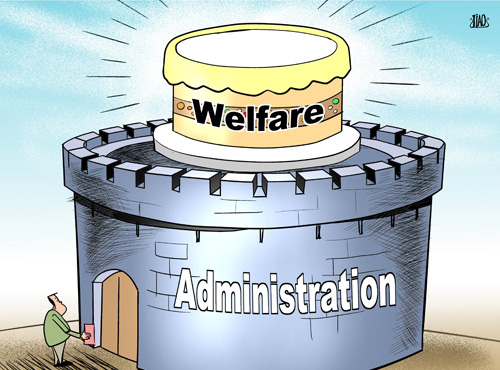Securing China's pensions: a race against time
- By Stuart Wiggin
 0 Comment(s)
0 Comment(s) Print
Print E-mail China.org.cn, July 4, 2012
E-mail China.org.cn, July 4, 2012
|
|
|
Pie in the sky [By Jiao Haiyang/China.org.cn] |
Recent proposals floating the idea of raising the retirement age in China have drawn the ire of many Chinese citizens as the government seeks to address a possible shortfall in its national pension fund in the very near future.
Last year, the number of Chinese citizens aged over 60 stood at 185 million, accounting for 13.7 percent of the total population, according to the China National Committee on Ageing. The predicted rise in this ageing portion of the Chinese population poses a significant problem for the government, as highlighted by a joint study carried out by the Bank of China and Deutsche Bank, which suggested that the government will be left with a shortfall of 18.3 trillion yuan by 2013.
One of the biggest problems facing China's pension fund is its poor return on investment, with only 2.04 percent of revenue for the basic pension fund coming from interest. Without dwelling on the specifics of a reasonably complicated pension system, it is clear that over the past ten years, investments made using pension funds have yielded returns of less than 2 percent. These returns are well below the rate of inflation, and much lower than the returns seen on pension fund investments in developed countries. The cause for these low returns is often blamed on the sluggish market, though a number of systemic problems remain.
|
Don't miss: |
The majority of China's pension funds are placed in fixed income investment products which have not kept pace with the rapid rise in inflation. Compounding this issue is a lack of information concerning how the government plans to invest these funds, which ultimately curtails competition within the pension fund market. Meanwhile, a fractured system sees local governments controlling basic pension funds without a system of unified management, the total amount of which has been estimated at 2 trillion yuan by Guo Shuqing, chairman of the China Securities Regulatory Commission.
At the beginning of June, the Shanghai Securities Journal quoted Chairman Dai Xianglong of the National Social Security Fund (NSSF), which manages the national pension fund on behalf of the government, in saying that the level of investment in private equity funds will be increased by more than 50 percent by the end of this year. Dai also stated that investment in private equity funds will increase from 19.5 billion yuan in 2011 to 30 billion yuan in 2012, according to the Shanghai Securities Journal. Additionally, the NSSF will hold a total amount of assets to the tune of 1 trillion yuan by the end of the year, Dai said. The NSSF's investment portfolio includes fixed income products, industrial equities, stocks, cash and cash equivalents; with roughly one-third of funds invested in stocks.
Elsewhere, some are arguing for investment in China's ailing securities market in order to inject vitality into the market and reap the benefits of such high risk investments. Such an approach would be perfectly fine if Chinese workers were offered defined-benefit pension plans, similar to those which certain companies in the United States offer, whereby the employer assumes the risk of all investments. However, these pension plans are becoming less common due to the shortfall that companies have to make up when the stock market performs badly, as it did in 2010. As a result, they are being replaced with defined-contribution plans, whereby the risk of investment falls solely on the employee.
As for the revenue which funds America's public retirement system, 73 percent of it is provided by investments, according to the National Conference of Public Employee Retirement Systems. When there is a shortfall in America's public pension fund, the US government is required to plug the gap with public sector funds. This is an obvious safeguard that could also be used in China, but given the fledgling nature of the Chinese stock market, any pension fund losses sustained from investments could seriously dent public sector finances and deprive other areas of society of much-needed funds.
As stated in a report by Reuters, according to the U.S. Census Bureau, the stocks, bonds and other investments held by U.S. public pension systems had losses totalling 692.5 billion dollars over 2008 and 2009; a sign of what can happen when the investment scheme for pension funds is diversified in an effort to maximise returns. It is clear that the government needs to address the possibility of a shortfall, and investing pension funds in the stock market would seem like the natural progression. However, this decision should not take place without improving market conditions by decreasing the difficulties associated with the Chinese business environment and improving the level of openness.
There is no doubt that officials are aware of the need for these reforms. However, balancing the two priorities of improving the market and increasing the return on pensions is a difficult task which will require years, not months, of patient and meticulous regulatory work.
Stuart Wiggin is a news editor at China Radio International. He graduated from Oxford University majoring in modern history and politics.
Opinion articles reflect the views of their authors, not necessarily those of China.org.cn.






